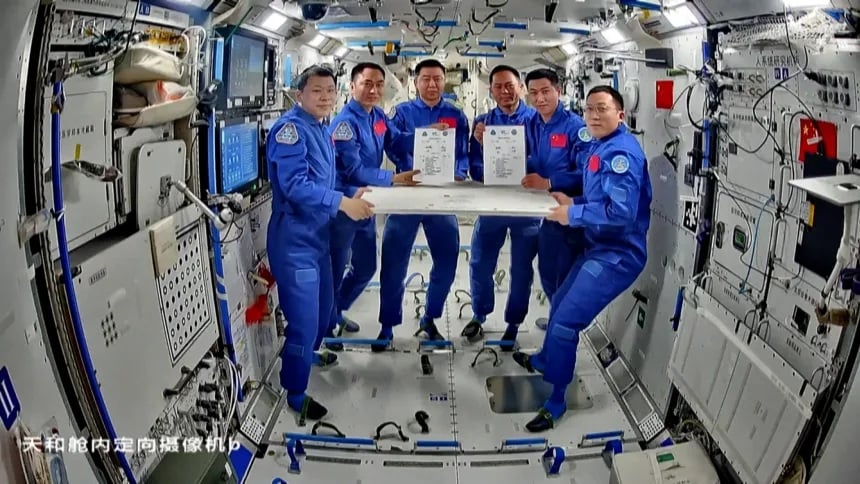Yesterday, on Nov. 14th, 2025, the crew of Shenzhou-20 has returned to Earth from China's Tiangong space station after a week's delay. The delay was imposed by damage inflicted on their spacecraft, allegedly caused by an impact with space debris. This impact cracked the window aboard the Shenzhou-20 spacecraft, forcing the crew to depart the station using the newly arrived Shenzhou-21 spacecraft. The three-person crew, consisting of Chen Dong, Chen Zhongrui, and Wang Jie, was originally scheduled to return to Earth on Nov. 5th.
The suspected impact postponed this while the six taikonauts aboard the station inspected the spacecraft, with support from mission controllers at the China Manned Space Agency (CMSA). According to a statement issued on Nov. 11th by the China Manned Space Engineering Office (CMSEO), the assessment and backup return plans were proceeding accordingly. The crew then departed the station aboard the Shenzhou-21 spacecraft at 10:14 p.m. EST (7:14 p.m. PST) on November 13th, indicating that the Shenzhou-20 spacecraft was deemed unsafe.
The crew landed in Inner Mongolia at 11:14 a.m. Beijing Time on November 14, 2025 (9:14 p.m. EST; 6:14 p.m. PST, November 15, 2025). The crew was examined by medical teams who determined that they were all in good health, according to the state-owned media company Xinhua. "Space exploration has never been easy for humankind. This mission was a true test, and we are proud to have completed it successfully," said Chen Dong to reporters. "China's space program has withstood the test, with all teams delivering outstanding performances... This experience has left us a profound impression that astronauts' safety is really prioritized.
 *Crew members of Shenzhou-20 and Shenzhou-21 signing documents for work handover on board the Tiangong space station on November 4, 2025. Credit: CCTV*
*Crew members of Shenzhou-20 and Shenzhou-21 signing documents for work handover on board the Tiangong space station on November 4, 2025. Credit: CCTV*
The CMSEO issued its findings that same day in an official statement, saying:
Based on preliminary analysis of photographs, design review, simulation analysis, and wind tunnel testing, a comprehensive assessment determined that the Shenzhou-20 [crewed] spacecraft’s return capsule window glass had developed a minor crack, most likely caused by an external impact from space debris, thus failing to meet the requirements for a safe crewed return. The Shenzhou-20 manned spacecraft will remain in orbit to conduct relevant experiments.
The Shenzhou-21 spacecraft launched from the Jiuquan Satellite Launch Center on Oct. 31st, 2025, delivering the replacement crew that is now operating on the space station - consisting of Zhang Lu, Wu Fei, and Zhang Hongzhang. The departure of the previous crew aboard their spacecraft leaves the Shenzhou-21 crew without a departure plan. However, this is likely to be remedied with the launch of the Shenzhou-22 spacecraft, which will not carry a crew.
The Shenzhou-20 crew achieved several firsts with this mission. Commander Chen Dong completed six extravehicular tasks, making him the taikonaut with the most extravehicular tasks to date. The delay also made them the first taikonauts to spend more than 200 consecutive days in space. The astronauts, along with the Shenzhou-21 crew, were also the first astronauts to enjoy a barbecued meal in space, which was timed to welcome the new crew to the space station.
This incident is also a significant developmental milestone for China's space program, demonstrating that the agency is prepared for contingency situations that inevitably arise in space. Their backup plans also mean that operations aboard the space station will continue uninterrupted. As the International Space Station (ISS) approaches retirement, China hopes that Tiangong and other successor stations will continue humanity's exploration and scientific operations in Low Earth Orbit (LEO).
Further Reading: SpaceNews

